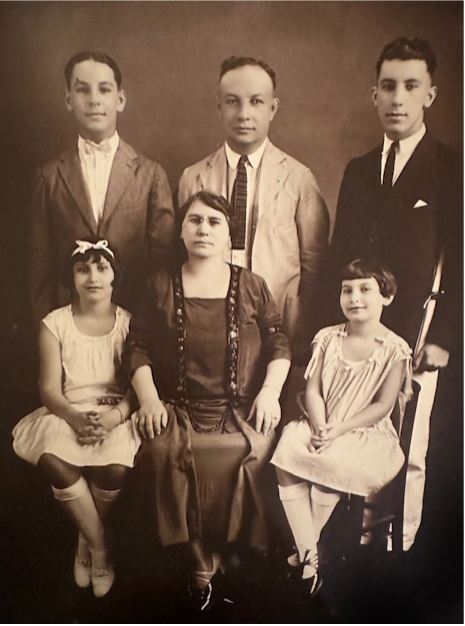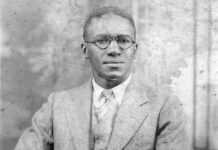
This article originally appeared in The Washington Post on July 14, 2025
On a bright summer’s day in Mobile, Alabama, as I walk Dauphin Street, the onetime mercantile heart of my hometown, I envision my grandfather, Morris Hoffman, a century ago, heading into his store. Past a 1920s display of sofas and easy chairs, he approaches a doorway leading to a second-floor staircase, touches the mezuzah and kisses his fingers, then climbs the steps to the rooms where he and his wife, Mary, both Romanian Jews, are raising their four Alabamian children.
Out the windows, he views the Dauphin Street businesses of other Eastern European Jews, of Greeks and Lebanese, Syrians and Sicilians. They are neighbors, sharing bread and cigars and, in fledgling English, exchanging tales of fleeing poverty, hatred and war, seeking refuge in this Gulf Coast town. Work, family and faith, on these immigrant blocks, drive their lives.
Although Morris died at 76 in 1956, when I was 3, he returns to me today as I visit this long-ago residence, with its rickety floorboards and peeling wallpaper. The dining room, where generations gathered for Sabbath dinners, now sits empty, its furniture gone to storage. Downstairs, in the store, Morris’s cane rocker holds the imprint of the back of his head, and his behemoth cash register languishes near the computers. The neon sign out front, in art deco glory, adds to the time warp, welcoming customers today as it has for decades: “Cheerful Credit: Hoffman Furniture Co.” But not for long.
I am witnessing the end of an era. Only 3 percent of American family stores, I’ve learned, survive to the fourth generation, with Morris’s realm among them. I’m not in the store’s patrilineal succession but am a student of its history. Through wars, weddings, funerals and changing fashions, the store kept on. And long after yet another legacy store of a Jewish immigrant family closed its doors, like Godchaux’s in New Orleans, Rich’s in Atlanta, Morris’s mezuzah held strong, the last on Dauphin Street. As I explore its contours for the last time, I am walking through rooms echoing with family stories. I can hear Morris advising, “Only family touches the cash register,” and joking, “They tell me the second million dollars is easier to make than the first, so I’ll start with the second.” I conjure the glass of schnapps that capped off his lunch, the watermelon in his icebox. I peer into the room where my aunt Becky died of an infection before the use of penicillin, and the balcony where my big sister Becky, named in her memory, held my little hand as we came to the store to watch Mardi Gras parades rollicking past.
Hoffman’s sales pitch was “low terms, easy credit,” its customers working folks paying over time. I was proud of our family name on the delivery trucks that rolled through town, and the radio jingle with the lyric, “We have ceiling fans and window fans, attic fans and basement fans, any old fan, even a baseball fan. H-o-double-f-man spells Hoffman.”
Dauphin Street wasn’t unique; there were blocks of immigrant strivers everywhere in America a century ago, including in the South. These enterprises were economic engines that propelled the next generations up and out, to higher education and professions — as with Morris’s grandchildren, among them a lawyer, a television director, an author and a rabbi.

Did Morris and his brethren face antisemitism in the Deep South? No doubt. Did it deter them? My father told of fistfights as a boy on Dauphin between the Jewish kids and others, escalated by name-calling, bullying. But he went on to practice law a few blocks from the store until he was 97. Next to the bigotry in Europe that Morris had fled, the streets of Mobile, Dad reasoned, looked pretty darn good. The destination was not by design.
Born in Piatra Neamt, Romania, in 1879, Morris stowed away on a steamer to Ellis Island, and met and married Mary in Brooklyn, where they had their first born, Lewis, known as Louie. Wanting to find a place easier to live and start a business, according to family lore, Morris went to a train station in 1908, plunked down his travel funds and asked for passage to a “small town, hot weather, good for family.” The agent said, “That’ll take you to Mobile, Alabama.” Mary and Louie joined him. My father was born over the store in 1909. Morris started in dry goods and signed the contract in 1923 for the property that became the furniture store. Louie succeeded him, then Louie’s son, Ronnie, then Ronnie’s son, Michael.
So the Hoffmans of Alabama began, with limitless possibilities — to dream, to toil, to rise, to seek what newcomers from afar, of any era and background, yearn for.
Now the store is being liquidated. The new property owners will take possession. Condos, clubs and restaurants are the new Mobile downtown. I am wistful about saying farewell, but I hear Morris, pragmatic to the end. In Yiddish he says, as my father liked to quote him: “Nim de gelt.” Take the money.
There is a photograph of Morris and Mary in their home over the store, formal and smiling, surrounded by their grown children and spouses, and the next generation — my generation, though I am not yet born — all dressed in Sabbath best. I think of it as our ancestral home. The store was a business, yes, but far more. It was, in Morris’s Yiddish, “beshert.” His destiny.
Roy Hoffman, whose most recent novel is “The Promise of the Pelican,” is a writer in Fairhope, Alabama.





